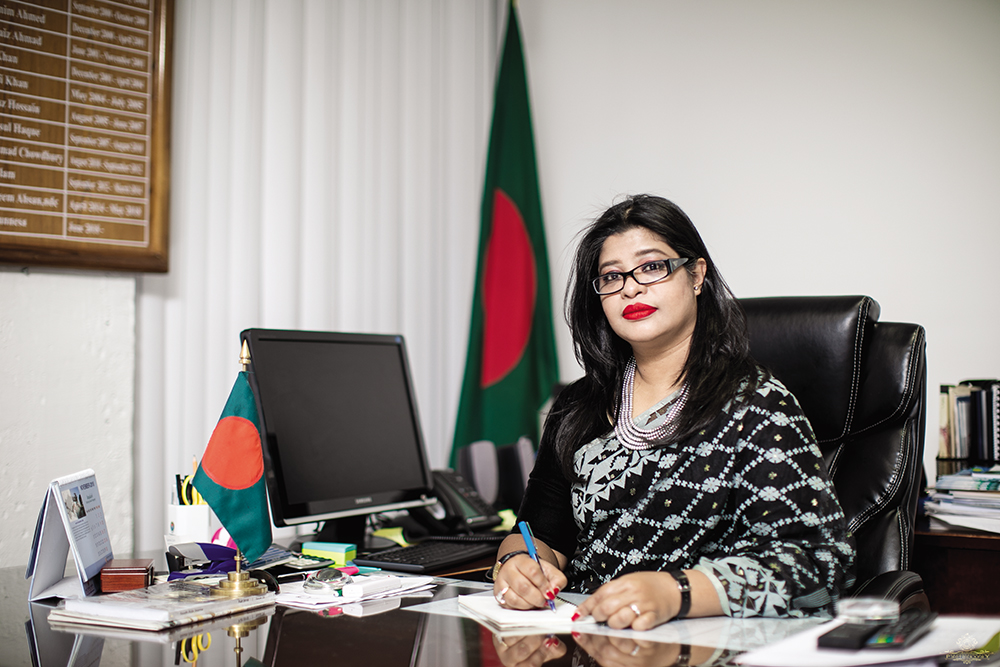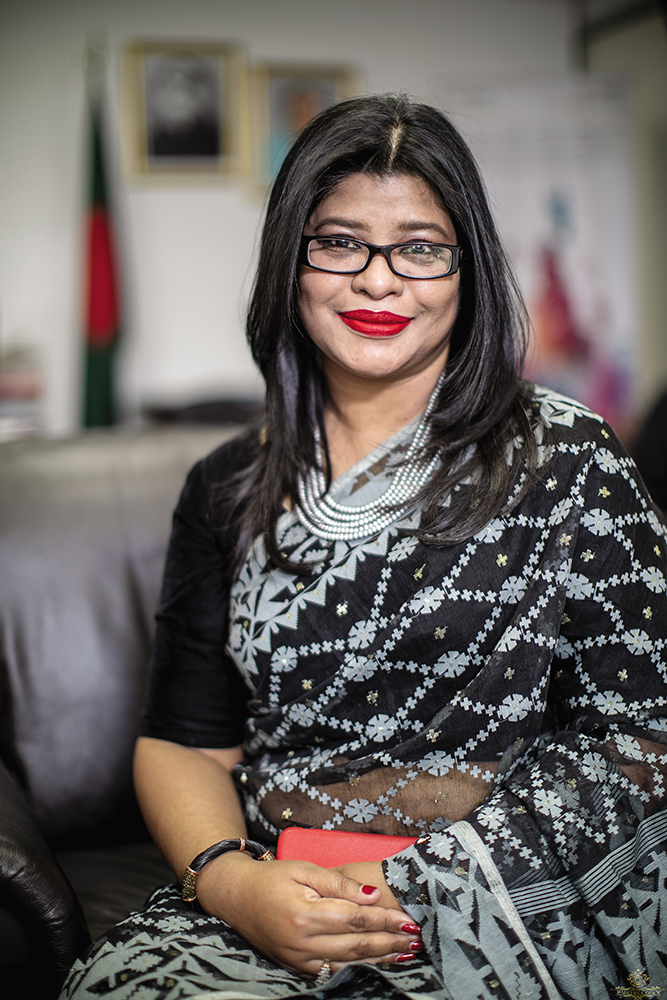Sadia Faizunnesa on culture, family and woman

Sadia Faizunnesa has joined 15th Consul General of Bangladesh in New York on 1st June, 2018. She is a diplomat as well as a passionate lover of art, culture, literature. She loves to interact with people and devotedly promote Bengali culture. In a conversation with Dima Nefartity, Colors New York correspondence, this culturally-oriented personality speaks about her journey as a diplomat while touching on issues of culture, woman and more.

Faizunnesa grew up in an extraordinary vibrant cultural atmosphere at home and educational institutions. Her mother Razia Khatoon was the first lady Brigadier of Bangladesh and an Anesthetist. Her father Brigadier Siddiki was a radiologist. Eminent singer Shabnam Mushtaree is her aunt. She fondly recalled when she was four years old, her father presented her a 100 years old German reed harmonium. That was the beginning of her journey with music. The harmonium is still with her as a token of inspiration and priceless belonging, she added. Later Faizunnesa was taught classical music for seven years from various enlightened music guru of Bangladesh and India including Khalid Hossain and Sohrab Hossain. She feels that learning classical music (vocal plus theoretical) was a landmark in her thought process.
The universal essence that she imbibed from classical music enriched her with an apt philosophy of life, which motivated her throughout her life to focus on positivity and stay as bold, brave, gutsy, spirited in any kind of situation. Faizunnesa was amongst the first intake in Mymensingh Girls Cadet College, the first ever girls cadet college in Bangladesh. She passed with distinction the high school and college board exams and was honored with “All-Rounder Cadet” award. Faizunnesa feels blessed to have grown up as a student under the guidance of various enlightened teachers in Mymensingh Girls Cadet College who filled up her senses with aesthetic beauty of life, nature as well as culture.
Faizunnesa obtained the Bachelor of Medicine and Bachelor of Surgery (MBBS) from Sir Salimullah Medical College in Bangladesh. She started loving medical science and wanted to be a pediatric surgeon when she was an intern medical student at Sir Salimullah Medical college. At that time most of the female students used to study gynecology. But wanted to break the mold and harbored the desire to be a pediatric surgeon. In the medical college, she was actively involved with debate and other cultural activities. She was an ardent debater in her student life and was the national champion in 1994 and Runner-up in 1993 in the Bangladesh Television
debate competition. She actively participated in literary and cultural activities and is also an enlisted A grade singer in Bangladesh Television and Bangladesh Betar. Additionally, she has been an extraordinary performer in Quran recitation. Faizunnesa also recalls that she was a regular member of all prominent libraries in Dhaka when she was a medical college student and it helped her to stay updated as a debater.
Faizunnesa joined Bangladesh Foreign Service on 25 January 1999 and she belongs to 18th BCS (Foreign Affairs) cadre. After joining the Bangladesh Foreign Service, she obtained a Masters Degree in Development studies from BRAC University and was conferred on Vice Chancellor’s Gold Medal. She attended professional diplomat courses in many countries including India, Germany, France, and Belgium and in the Bangladesh Foreign Service Academy. Though she had chances to study development studies in London, she preferred to study at BRAC University so that she could be interact with her country people directly to know the necessity of appropriate development model and needs of the masses.
“Adaptability is a basic need for a diplomat. A diplomat is like a duck whose legs are continuously propelling under the water, but the duck is calm and stable at the top of the water,” Faizunnesa explains.
Immediately before joining as consul general she served as the director general, United Nations Wing at the Ministry of Foreign Affairs. She has had previous experience and on the job training on consular and welfare activities for the Bangladesh Community in Germany, Austria, and the Czech Republic while she was posted at the Bangladesh Embassy in Berlin, Germany.
She had also served as deputy permanent representative of Bangladesh to the United Nations in New York; counselor, head of chancery and deputy permanent representative of Bangladesh to ESCAP, Bangkok, Thailand; and in different capacities in the bilateral, multilateral and administration wings at the Ministry of Foreign Affairs, Dhaka. She had actively participated as a member of Bangladesh delegation in 68th to 72nd general assembly of the United Nations. In her immediate past assignment as director general (UN, Human Rights, and Humanitarian Affairs), she worked very closely in mobilizing the support of the international community and facilitating humanitarian assistance for the forcibly displaced Rohingyas.

Faizunnesa takes a special interest in Diaspora diplomacy and strongly believes that Diaspora is the strong agent for promoting the image of Bangladesh around the world. She has expressed commitment to deliver her best in upholding the interests and wellbeing of the Bangladesh community.
Faizunnesa believes in development diplomacy. She feels that Diaspora diplomacy should be more focused. She had the experience of multilateral diplomacy and development role in United Nations but she wanted to be experienced in community service that is why she was inclined to work in New York in public diplomacy.
“I have never seen such a vibrant Bangladeshi Diaspora in somewhere else,” she observes, adding that, “New York seem like a friendly neighborhood. Here are the Bengali taxi drivers who are found in the streets and represent Bangladesh. Here you can read Bengali newspapers while on a walk in the streets. So much cultural programs in the community, that they seem overwhelming to me. Here Bangladesh community projects Bangladesh so beautifully that sometimes I feel as though I am in Bangladesh!”
She further adds, “I believe, every expatriate is an ambassador of the country. Expatriates are promoting Bangladesh through their work. They are working to develop the image of Bangladesh. I met with several mayors of my jurisdiction in New York. When I met the mayor of Cambridge, I told him about the development in Bangladesh. Whenever I represent Bangladesh to the mainstream in the USA, I inform them about the passion of the Bengali people as well as the innovative power and the free spirit. I think community activities should be aimed at reducing the division between Bengali community and the mainstream America.” Faizunnesa dreams of celebrating the Bengali New Year in the New York Central Park. “I am working on that goal. I planted the seed. If I can’t finish, I hope, someone after me will finish the work,” she says.
Since her childhood, Faizunnesa’s idol and inspiration was Bangabandhu Sheikh Mujibur Rahman. She feels fortunate enough to work closely with prime minister Sheikh Hasina, the dynamic daughter of Bangabandhu Sheikh Mujibur Rahman. Bangladesh has become a middle-income country in Sheikh Hasina’s sincere efforts. Her contribution to empowering women cannot be overemphasized.
“Her role in the Rohingya issue is very much admirable. Prime Minister Sheikh Hasina earned the respect of becoming one of the world leaders in her capacity today,” adds Faizunnesa.
Faizunnesa believes that “women’s biological clock and career clock are very different. That is why we need to develop a system and coping mechanism in order to synchronize our biological clock and career clock.” In most cases women happen to be more sincere and responsible at work. They take work not as a job, but as a passion, she adds.
“A full time working women have to make a decision over their priorities, every moment they are trading off and sacrificing much – however we only hear about their success at work – but we need also to address the unheard sacrifices of working women,” she feels. Faizunnesa is emphatic about one thing: “The traditional mindset of men towards working women needs to change.”
“In my family, I have two loving sons and an excellent cooperative husband. I am thankful for my wonderful husband and sons that they have helped me to become stronger each day with their support and love,” she concludes.



